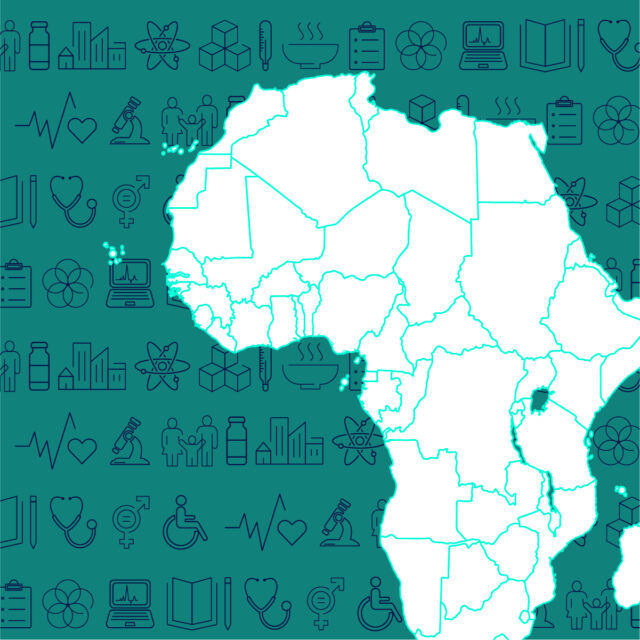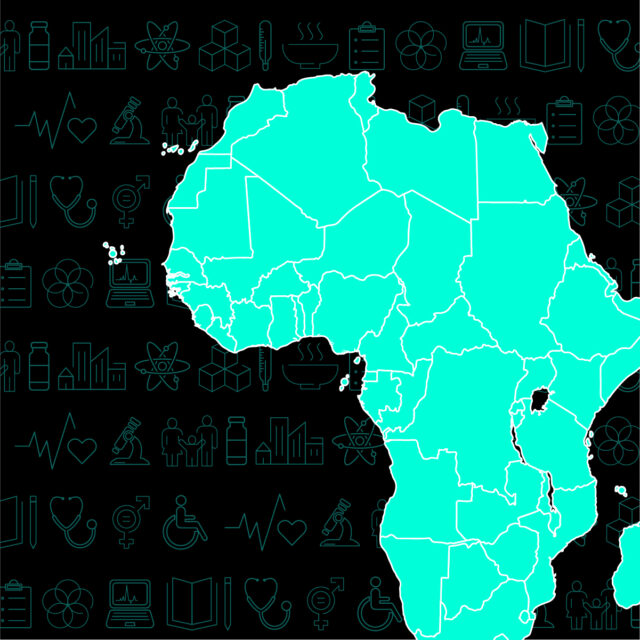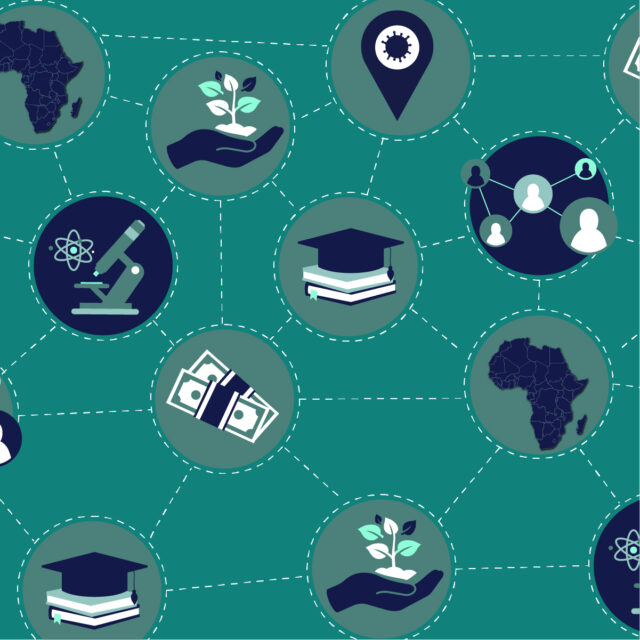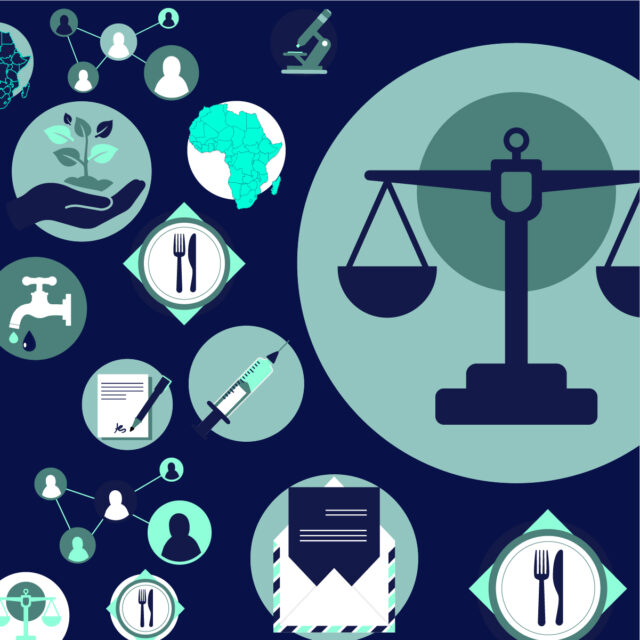Top news
Africa rising: COVID-19 cases are surging across Africa, with many countries experiencing a fourth wave amidst the Omicron variant. In Nigeria, the number of daily confirmed infections over the past week jumped from 76 to 451, following the discovery of the new variant in the country. Both South Africa and Kenya surpassed the WHO high-risk threshold of 5% for COVID-19 cases, with South Africa exceeding a 30% positivity rate and Kenya at 6.5%. However, despite the surge of COVID-19 infections in Africa, the number of associated deaths so far is lower than previous waves.
Travelling in the fast lane: The Omicron variant multiplies 70 times more quickly than previous versions of coronavirus, according to a new laboratory study in Hong Kong. But experts are urging caution in applying findings from laboratory studies to the real world. A South African study released Tuesday suggests that Omicron causes less severe illness than earlier variants but is better at eluding vaccines. The study found that two doses of the Pfizer-BioNTech vaccine provides just 33% protection against Omicron, but may offer 70% protection against hospitalization. A UK study suggests that booster shots could be up to 75% effective against symptomatic infection from Omicron. Small studies of Sinovac’s vaccine, the world’s most widely administered, found “inadequate” immunity responses against Omicron. Pfizer announced that its new oral pill reduced hospitalizations and deaths among at-risk people by almost 90%, and should be effective against Omicron. Win-win!
Deja vu: The WHO is expressing concern that rich countries could “revert” to vaccine hoarding in light of Omicron, which could lead to a 3 billion dose shortfall for the rest of the world in early 2022. Eight times more people have received boosters in wealthier countries than first doses in low-income countries — despite limited evidence that boosters are needed to protect against severe illness. Ghana’s President Nana Akufo-Addo warned EU lawmakers that “vaccine nationalism” and “vaccine hoarding” linked to boosters could hinder vaccination efforts in Africa. The wide vaccine gap between African and EU countries could undercut the EU’s stated desire to “reset the bloc’s ‘partnership’” with Africa at the EU-AU Summit in February. Maybe EU officials will find a solution to this problem at the European Council meeting on Thursday, where they’ll “discuss international solidarity and ways of ensuring global vaccine coverage.” Here are two ideas: 📣SHARE VACCINES 📣SUPPORT A TRIPS WAIVER
All for some and whatever’s left for all: The vaccination rate for high-income countries surpassed 70% last week 👍🏽. Yet only 8% of Africans are fully vaccinated 👎🏽. An alarming 89 countries are off track to achieve the global target of 70% vaccination by September 2022 👀. In some good news, France announced it has donated 75.6 million vaccine doses, exceeding its 2021 commitment and putting it on track to meet its commitment to share 120 million doses by mid-2022. Over 58% of those doses have gone to 35 African countries. Bravo! Check whether other wealthy countries are delivering on their promises to help end the pandemic in our Pandemic Response Report Cards.
Getting high on profits: 167 million people, concentrated in low- and middle-income countries, are at risk of being excluded from COVID-19 vaccination campaigns. That’s because just four vaccine manufacturers — Clover, J&J, Sinopharm, and Sinovac — have agreed to waive indemnification requirements for the COVAX Humanitarian Buffer, a mechanism to ensure high-risk and vulnerable populations in humanitarian settings can access COVID-19 vaccines. Other vaccine manufacturers, including AstraZeneca, Moderna, and Pfizer-BioNTech, have refused to waive indemnification, preventing COVAX from administering their vaccines to refugees and displaced people. Some companies are charging as much as $37 per dose and enjoying exponential growth in revenues, profits, and market capitalization, leading to accusations of “war profiteering.”
COVAX competition: The WHO is calling for a new set of rules for COVAX to prevent vaccine hoarding by high-income and vaccine-producing countries. COVAX, which had pledged to deliver 2.3 billion doses to low- and middle-income countries in 2021, may only deliver 800 million doses, due in part to supply constraints. Production issues with AstraZeneca’s vaccine in India has positioned Pfizer-BioNTech to soon supplant AstraZeneca as COVAX’s top vaccine supplier. That could pose challenges for countries not equipped to manage the cold chain storage requirements of the Pfizer-BioNTech vaccine. Meanwhile, Kenya and Rwanda have launched programs aimed at boosting their capacity to build energy-efficient, sustainable refrigeration.
Cheap shots: The Serum Institute of India announced it was slowing its COVID-19 vaccine production, due to decreased demand. It said that stems from both COVAX’s shift to other vaccines, as well as absorption challenges in low- and middle-income countries, including vaccine hesitancy. John Nkengasong, head of the Africa Centres for Disease Control, called that explanation “condescending.” He accused the Serum Institute of India of eroding Africans’ trust by abruptly ending talks last year with the Africa Vaccine Acquisition Task Team over a vaccine deal believed to be almost complete.
African vaccine mandates: African governments and companies have instituted vaccine mandates and other restrictions in response to Omicron and surging COVID-19 cases across the continent. Ghana recently imposed a hefty fine on airlines, charging $3500 for every non-fully vaccinated passenger who flies into Accra’s international airport. In South Africa, more universities are instituting mandatory COVID-19 vaccination mandates, set to take effect in 2022. In Nigeria, the Economic and Financial Crimes Commission and the National Youth Service Corps are enforcing mandatory COVID-19 vaccinations for all employees. Meanwhile, a Kenyan court suspended the government’s mandatory vaccination order that barred the unvaccinated from accessing certain services and public places. Only 6.1% of Kenyans are fully vaccinated.
Falling short: On Wednesday, the World Bank announced a $93 billion IDA20 replenishment package, well short of the $100 billion requested by African leaders. 48 bilateral donors pledged a total of $23.5 billion, flat in nominal US dollars compared to IDA19. The UK cut its pledge by an eye watering 55% 😭. Due to a truncated two-year cycle, IDA19’s envelope has been adjusted from $82 billion to $71 billion; the $11 billion difference will be carried over to IDA20. Nonetheless, the uninspired commitments from some donor countries was a missed opportunity to better enable low-income countries to fight COVID-19 and eventually recover.
Reversal of fortunes: Foreign direct investment (FDI) in emerging markets (excluding China) has stagnated, due to growing concerns that many economies will not recover from the pandemic next year and expectations of rising US interest rates. FDI to Africa is expected to fall 25% short of 2019 levels, reversing progress made on the SDGs. That comes as the World Bank estimates that over half a billion people have been pushed (or pushed further) into extreme poverty due to rising health care costs, with the pandemic threatening to reverse two decades of health gains. Compounding the problem, the pandemic continues to disrupt the global economy: Several districts in the Zhejiang province, one of China’s major export hubs, shut down business operations due to a COVID-19 outbreak that’s left half a million people quarantined and could further stress global supply chains.
The numbers
- 2114: The year Ghana will achieve 70% vaccination of its people at current rates. (World Bank)
- 5.7%: The percent of Nigeria’s population covered by its current vaccine supply. (ONE’s Africa COVID-19 Tracker)
- $93 billion: The amount pledged to IDA by wealthy countries, $7 billion short of what African leaders requested. (World Bank)
More reads
- Are SDRs helping African economies recover faster? Rasna Warah explores.
- Don’t show up to a fight against a global pandemic with a local game plan, advises Larry Brilliant.
- This satirical TikTok video highlighting the hypocrisy of misinformation peddlers may have you nodding your head (and pumping your fist).
- Russia’s COVID-19 diplomacy in Africa is a mixed bag, says Paul Stronski at the Carnegie Endowment for International Peace.
- Check out the cool and informative data visualizations about vaccine supply and demand in the most vulnerable places in this New York Times piece.
- It’s time to democratize African public finance management systems to finance the increasing demands of citizens, argues Ken Opalo.



